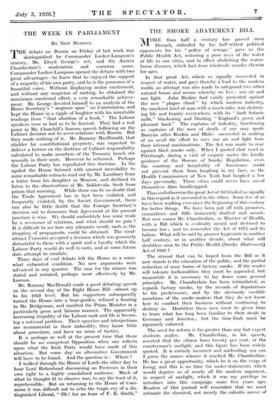THE WEEK IN PARLIAMENT
BY NEW MEMBER.
THE debate on Russia on Friday of last week was distinguished by Commander Locker-Lampson's oratory, Mr. Lloyd George's wit, and Sir Austen Chamberlain's moderation and common sense. Commander Locker-Lampson opened the debate with two great advantages—he knew that he enjoyed the support of a majority of his own party, and he is the possessor of a beautiful voice. Without displaying undue excitement, and without any suspicion of ranting, he obtained the maximum emotional effect, a very remarkable achieve- ment. Mr. George devoted himself to an analysis of the Home Secretary's "magnum opus" on Communism, and kept the House in a ripple of laughter with his inimitable • readings from "that abortion of a book." The Labour - speakers were so bad as to be farcical. They had a real point in Mr. Churchill's famous speech following on the Cabinet decision not to sever relations with Russia. But they made nothing of it. Mr. Ramsay MacDonald, that stickler for constitutional propriety, was expected to deliver a lecture on the doctrine of Cabinet responsibility Calculated to make members of the Treasury bench stir uneasily in their seats. However he refrained. Perhaps the Labour Party has repudiated this doctrine. In the upshot the House listened with amused incredulity to Some remarkable extracts read out by Mr. Lansbury from a letter from his daughter in Moscow, and declined to listen to the observations of Mr. Saklatvala, fresh from prison that morning. While there can be no doubt that the Trade Agreement has in fact been violated, and frequently violated, by the Soviet Government, there can also be little doubt that the Foreign Secretary's decision not to denounce that Agreement at the present juncture is wise. We should undoubtely lose some trade by a severance of relations, and what should we gain ? It is difficult to see how any adequate result, such as the stopping of propaganda, could be obtained. The recal- citrant Unionists accepted a decision which was genuinely distasteful to them with a spirit and a loyalty which the Labour Party would do well to note, and at some future date attempt to emulate.
Three days of coal debate left the House in a some- what exhausted condition. No new arguments were advanced in any quarter. The ease for the miners was stated and restated, perhaps most effectively by Mr. Lawson.
Mr. Ramsay MacDonald made a good debating speech on the second day of the Eight Hours Bill—almost up to his 1923 level. But his supporters subsequently turned the House into a bear-garden, refused a hearing to Mr. Bridgeman, and insulted the Prime Minister in a particularly gross and fatuous manner. The apparently increasing stupidity of the Labour rank and file is becom- ing a national problem. Their speeches and interjections are monumental in their imbecility, they know little about procedure, and have no sense of tactics.
• It is perhaps as well at the present time that there should be no competent Opposition when one reflects upon what the Irish Party would have made of this situation. But some day an alternative Government will have to be found. And the question is : Where ?
I walked through the House of Lords the other day to hear Lord Birkenhead discoursing on Peeresses in their own right to a highly scandalized audience. Much of What be thought fit to observe was; to say the least of it, reprehensible. But on returning to the Houk of Com- mons it was difficult not to echo the tragic cry of a dis- tinguished Liberal, " Oh ! for an hour of F. E. Smith."










































 Previous page
Previous page